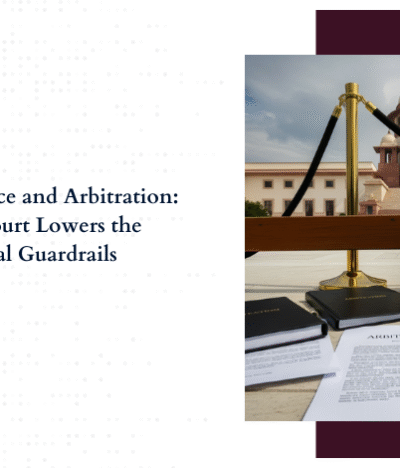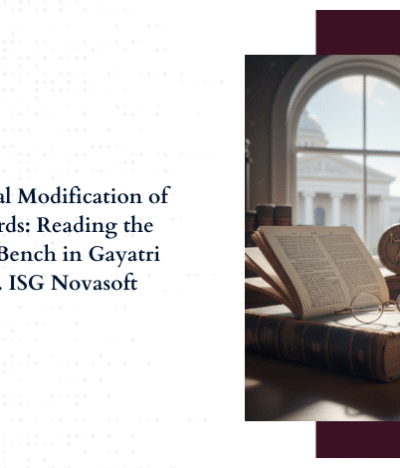Who inherits property if there is no will in India? The process of transfer of property after death without a will in India is governed by the laws of intestate succession. When an individual dies without leaving a will, their property is distributed among their legal heirs as per the applicable personal laws, such as the Hindu Succession Act 1956, Muslim Personal Law, or Indian Succession Act, 1925. These laws dictate the hierarchy and proportions in which the deceased’s estate is to be divided.
The transfer of property after death without will involves several legal steps, including obtaining a legal heir certificate, succession certificate and completing the mutation of property records. This process can be complex and time-consuming, often leading to disputes among heirs and challenges related to incomplete documentation. Understanding the legal framework and requirements for the transfer of property after death without a will in India is crucial for heirs to navigate this intricate process efficiently and ensure a smooth transition of ownership
How to Transfer Property After Death Without Will in India
The transfer of property after death without a will in India can be a complex and challenging process. The absence of a will means that the property must be distributed according to the intestate succession, which varies based on the personal law applicable to the deceased. Each step involves meticulous legal procedures to ensure that the transfer of property after death without will is conducted smoothly and in accordance with the law.
Intestate Succession
Intestate succession refers to the legal process where the property of a deceased individual is distributed among their legal heirs as per the laws of intestate succession applicable to them. Following is the process for for intestate succession (without will)
1. Identifying Legal Heirs
The first step in the process is to determine who the legal heirs are. The personal law applicable to the deceased governs this identification.
- The Hindu Succession Act, 1956:
Class I heirs (spouse, children, and mother) have the primary right to inherit the property. If no Class I heirs are available, the property devolves upon Class II heirs such as the father, grandchildren, siblings, and other relatives. And if no Class II is available it passes on to Agnates and Cognates.
- Indian Succession Act, 1925:
For Christians and Parsis, this act outlines that the property is divided among the spouse, children and other close relatives.
- Muslim Personal Law (Shariat) Application Act, 1937:
In Muslim law, inheritance is divided as per the principles of the Quran, where fixed shares are allotted to each heir.
Identification of legal heirs is critical as it forms the basis for further legal documentation and the transfer process.
2. Obtaining a Legal Heir Certificate
The legal heir certificate is a crucial document that establishes the relationship between the deceased and the heirs. The procedure to obtain it includes:
- Application Submission
Heirs need to submit an application to the appropriate authority (District Court or Tehsildar Office). This application should include details about the deceased and the heirs, such as names, addresses and their relationship to the deceased.
- Supporting Documents:
Documents like the death certificate of the deceased, proof of identity and address of the applicant and other relevant documents must be submitted. The documents will be verified by the authority
- Issuance of Certificate:
Once the verification is completed, the legal heir certificate is issued, listing all the legal heirs and their relationship to the deceased. This certificate is essential for claiming the deceased’s movable and immovable assets.
3. Applying for a Succession Certificate
For transferring assets like debts, property or securities, a succession certificate is required:
- Petition Filing:
Heirs need to file a petition in the civil court having jurisdiction over the area where the deceased resided. The petition should include details about the deceased, heirs and assets.
- Notice Publication:
The court will order the publication of a notice in a local newspaper inviting objections, if any, to the issuance of the certificate.
Hearing and Verification: After a specified period, if no objections are received, the court conducts a hearing. Heirs might need to provide further evidence or documents.
- Issuance of Certificate:
Once satisfied, the court issues the succession certificate, authorizing the heirs to claim the movable assets of the deceased.
4. Execution of Partition Deed
When the property is to be divided among multiple heirs, a partition deed is executed:
- Drafting the Deed:
The partition deed is drafted, detailing the division of the property among the heirs. It must be clear and specify the share of each heir.
Agreement by Heirs: All legal heirs must agree to the terms of the partition and sign the deed.
- Registration:
The partition deed must be registered with the local sub- registrar’s office. The registration process includes paying a stamp duty based on the value of the property being divided and an additional registration fee.
- Legal Validity:
Registration of the partition deed provides legal validity and ensures that the division is officially recorded.
5. Mutation of Property Records
Mutation is the process of updating the property records to reflect the new ownership:
- Application for Mutation:
Heirs must submit an application for mutation at the local municipal office or land revenue office. This application should be accompanied by the death certificate, legal heir certificate, succession certificate, partition deed and other necessary documents. The municipal or revenue authorities will verify the documents
- Approval and Update:
Upon satisfactory verification, the authorities approve the mutation, and the property records are updated to reflect the names of the new owners. This step ensures that the property is officially transferred.
Common Challenges of Transferring Property Without Will in India
Transfer of property after death without a will in India presents numerous challenges:
Disputes Among Heirs
In the absence of a will, disputes among heirs are frequent. These disputes often arise from ambiguities regarding the rightful share of each heir. Heirs may contest each other’s claims, leading to litigation. The judicial process to resolve such disputes can be lengthy and costly, often requiring court intervention to adjudicate the rightful entitlements and to issue necessary orders for the distribution of the property.
Incomplete Documentation
Transferring property without a will often encounters significant delays due to incomplete documentation. Essential documents such as the death certificate, legal heir certificate and property ownership records are mandatory for the transfer process. Missing or incomplete documentation can halt proceedings until the necessary records are obtained and verified by relevant authorities, thereby complicating and prolonging the process
Time-Consuming Procedures
The legal processes involved in transferring property, such as obtaining a legal heir certificate, succession certificate and completing the mutation process, are time-consuming. These procedures involve multiple steps, including verification by authorities, submission of numerous documents and compliance with statutory requirements, leading to significant delays in finalizing the transfer
Costs Involved
Transferring property without a will can incur substantial legal costs, including court fees, registration charges and more. The financial burden of these expenses can be significant, particularly in contentious cases requiring extensive legal intervention. These costs add to the overall complexity of the property transfer process.
Conclusion
Navigating the transfer of property after death without a will in India is a multifaceted process requiring adherence to specific legal frameworks and procedures. Understanding the applicable laws of intestate succession, whether under the Hindu Succession Act, 1956, Indian Succession Act, 1925, or Muslim Personal Law, is crucial for determining rightful heirs. The inherent challenges like disputes among heirs, incomplete documentation and time-consuming procedures require a thorough understanding which significantly aids heirs in efficiently managing the transfer of property.
Ensure a Smooth Property Transfer Today
Ensuring legal compliance and maintaining proper documentation during the property transfer process is paramount. A correctly executed transfer not only facilitates a smooth transition of ownership but also mitigates the risk of future disputes and legal complications. With extensive experience in handling property transfers, ACM Legal is dedicated to providing personalized legal solutions tailored to your specific needs. Our team of professionals is committed to guiding you through every step of the process, ensuring that all legal requirements are met efficiently and effectively.
FAQs
1. How to transfer property after death without a will in India?
To transfer property after the death of an individual without a will in India, the legal heirs must follow a series of steps. First, they must identify the legal heirs as per the applicable personal law (Hindu Succession Act, Indian Succession Act or Muslim Personal Law). Then, they need to obtain a legal heir certificate from the appropriate authority, which confirms their status as legal heirs. For movable assets, a succession certificate from the civil court is required. If the property is to be divided among multiple heirs, a partition deed must be executed and registered. The final step involves the mutation of property records, updating them to reflect the new ownership.
2. What documents are needed to transfer property after death without a will?
Documents Needed to Transfer Property After Death Without a Will
- Death Certificate
- Legal Heir Certificate
- Succession Certificate
- Partition Deed (if applicable)
- No Objection Certificate (NOC) from other heirs
- Identification Proof of Heirs
- Address Proof of Heirs
- Property Ownership Documents
3. Who are considered legal heirs in the absence of a will in India?
In the absence of a will in India, legal heirs are determined according to the personal law applicable to the deceased. Under the Hindu Succession Act, 1956, Class I heirs include the spouse, sons, daughters, and mother of the deceased. If there are no Class I heirs, the property passes to Class II heirs, such as the father, grandchildren, and siblings. For Muslims, inheritance is governed by Sharia law, which designates specific shares to heirs like the spouse, children, and parents. For Christians and Parsis, the Indian Succession Act, 1925 applies, dividing the estate among the spouse, children, and other close relatives
4. What are the common challenges in transferring property without will?
Transferring property without a will in India presents several challenges. Disputes among heirs are common, as the lack of a clear will can lead to conflicts over rightful shares, necessitating judicial intervention. Incomplete documentation, such as missing death certificates or legal heir certificates, can delay the process. Multiple heirs complicate the division of property, especially when there is no consensus. Outstanding debts of the deceased must be settled before the property transfer, further complicating the process.
5. How long does it take to transfer property without a will in India?
Transferring property without a will in India can take several months to several years, depending on various factors such as the complexity of the estate, the number of heirs involved, and the efficiency of the legal and bureaucratic processes. Legal challenges, incomplete documentation, and the need for court interventions can further extend the timeline.






